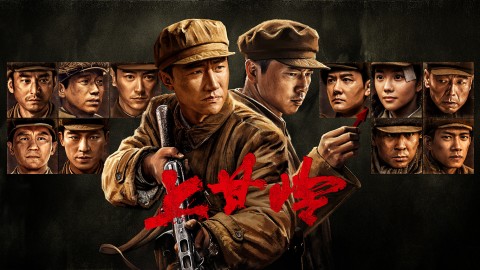Review of 'South Sea Tomb': A Promising Drama with Room for Improvement
On November 27th, "South Sea Tomb" was aired. Not only does it share some connections with its predecessor, "Kunlun Divine Palace," in terms of the storyline, but the creative team is also largely the same. Directed by Cai Yue Xun, the drama features a talented trio consisting of Pan Yue Ming, Zhang Yu Qi, and Jiang Chao. Ming Shu, played by Tang Zhen Ye, makes an early appearance, which leads to speculation about whether the two dramas were filmed together.
While binge-watching the first three episodes, it becomes apparent that this drama, produced by Seven Impressions and supervised by Guan Hu, has some shortcomings in terms of production quality, a casual attitude, and exaggerated performances.
Let's start with the production. After watching the first three episodes, it is noticeable that there are fewer outdoor scenes and more indoor scenes. In fact, some outdoor scenes are even shot in a studio, indicating a clear intention to meet deadlines. For instance, in one indoor scene, Pan Yue Ming is positioned by a window, but the landscape outside the window is clearly added in post-production, lacking authenticity and exhibiting average post-production skills.
Most of the outdoor scenes suffer from similar issues—poor lighting, making them look cheap and lacking the simulated sunlight. By the third episode, it becomes evident that the story primarily takes place on a ship, which limits the variety of settings. The production team sets up a ship and adds hydraulic devices to simulate the rocking motion, but it falls short of capturing the realistic feel of the ship's movement, ocean waves, and splashing water. To be honest, after watching the first three episodes, expectations for the subsequent production quality are not high.
Now, let's talk about the attitude. Apart from the production shortcomings, there are some doubts about whether the director intended to turn "South Sea Tomb" into a sitcom. The pacing of the first three episodes is sluggish, with diluted plotlines. Moreover, there are several instances where Hu Ba Yi, portrayed by Pan Yue Ming, mentions how things were in the "previous season" or "by the second episode." This deliberate attempt to break the immersion of the audience is not ideal, considering that the drama belongs to the action and adventure genre. Is it meant to be self-deprecating?
Next is the acting. The ensemble cast of "South Sea Tomb" varies in terms of their portrayal of characters. The characters' motivations are unclear, and the logic is often muddled. Pan Yue Ming and Zhang Yu Qi manage to maintain a decent performance level, while Jiang Chao seems to be lacking in energy, appearing tired throughout. The supporting cast doesn't deliver compelling performances.
If the drama had been well-executed, the confined space on the ship, with Hu Ba Yi, Sherry Yang, Ming Shu, Cheng Dong as Da Li, Gu Cai, and Duo Ling, each carrying their own secrets and motives, should have created a tense and mysterious atmosphere, brimming with suspense. However, after the characters board the ship in the third episode, the atmosphere completely lacks this feeling. The actors fail to elevate the tension, leaving the audience wanting more.
Prior to its airing, there were rumors that "South Sea Tomb" might not be released. The fact that it eventually aired naturally debunked those rumors. The successful release of "South Sea Tomb" not only saved Chen Mu Chi but also had an impact on his ongoing controversy. Due to continuous revelations by Wu Chu Yi, Chen Mu Chi's reputation had been in turmoil for over a month. Although the public sentiment has gradually cooled down since Wu Chu Yi stopped disclosing information, the impact on Chen Mu Chi remains. He has maintained a low-profile and silence for a period of time.
With work halted and his appearances erased from reality shows, various pieces of evidence led to speculations about whether Chen Mu Chi would be blacklisted. However, apart from a few extreme cases with severe negative impacts, where official statements are issued regarding the blacklist, most stars who no longer appear in public due to negative news do not face explicit blacklisting. The ambiguity surrounding this issue is more a result of caution and concern within the industry, which effectively puts a pause on their careers.
After all, neither the investors, production teams, nor program producers are willing to take risks.
And this time, "South Sea Tomb" successfully aired, which, on the one hand, proves that Chen Mu Chi is not a blacklisted artist. At least he received recognition from the relevant authorities, allowing the work he participated in to be aired. On the other hand, with the endorsement of Tencent Video, a major platform, it is enough to give confidence to the industry. It is believed that in the future, whether it's film and television production companies, reality show producers, or advertisers, they will all come back in droves and collaborate with Chen Mu Chi once again.
The release of "South Sea Tomb" officially declares that Chen Mu Chi has smoothly weathered this public opinion crisis.
In addition, the release of "South Sea Tomb" also saved Wu Ershan and the second and third parts of "Fengshen."
During this period, Wu Ershan's anxiety level should be no less than that of Chen Mu Chi. There have been precedents where actors' actions have affected the release of films and TV shows. The total investment in the "Fengshen" trilogy reached a staggering 3 billion yuan, and the box office of the first film only recovered slightly over 2 billion yuan, barely breaking even with the production cost. If the aircraft carrier formed by the three films were to sink due to Chen Mu Chi's inability to be released, the first one to go down would be Wu Ershan, who participated in the film's investment.
It is believed that the airing of "South Sea Tomb" will bring relief to Wu Ershan. Of course, it also saved the film itself. Currently, the post-production of the second part of "Fengshen" has not been completed, and the box office profits from the first film will be invested in the post-production of the second part. For a large-scale film like "Fengshen," in addition to the substantial costs of post-production, there are also additional income streams outside of theatrical release, such as copyright cooperation and business collaborations with brands. When the future and fate of the film are uncertain, these collaborations will undoubtedly be terminated or suspended. If Chen Mu Chi is safe, the film is safe, and the collaboration with various partners can continue, allowing the second and third parts of "Fengshen" to survive successfully.
The viewpoint remains the same: a work should not be ruined because of one actor's issue. Film and television are collective creations that involve the hard work of many people. I wish "South Sea Tomb" success in its airing, and I also anticipate the timely release of the second and third parts of "Fengshen."


